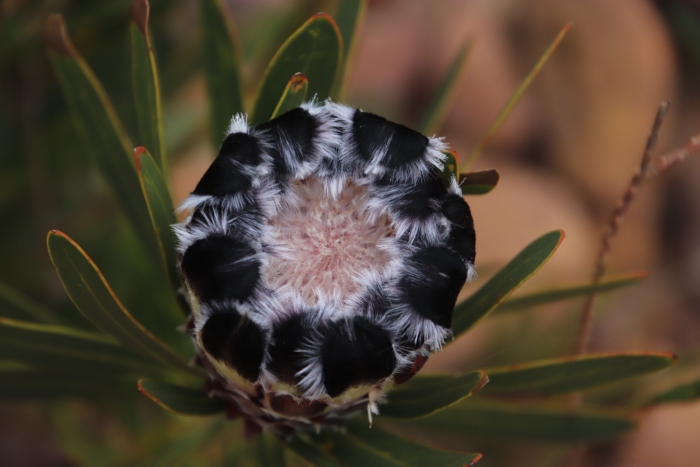Black Bearded Sugarbush
(Protea lepidocarpodendron)
Black Bearded Sugarbush (Protea lepidocarpodendron)
/
/

Tony Rebelo
CC BY-SA 4.0
Image By:
Tony Rebelo
Recorded By:
Copyright:
CC BY-SA 4.0
Copyright Notice:
Photo by: Tony Rebelo | License Type: CC BY-SA 4.0 | License URL: http://creativecommons.org/licenses/by-sa/4.0/ | Rights Holder: Tony Rebelo | Publisher: iNaturalist | Date Created: 2019-07-28T10:51-07:00 |
























Estimated Native Range
Summary
Protea lepidocarpodendron, commonly known as Black Bearded Sugarbush, is a bearded Protea species in the section Speciosae, part of the Proteaceae family. This evergreen shrub is native to the fynbos region, specifically the Western Cape of South Africa, from Cape Town to Kleinmond. It typically grows between 3-6.5 feet tall and has a similar spread, with narrowly oblong leaves that contribute to its dense foliage. The oblong flowerheads are distinctive, adorned with a purple-black beard and black hairs, which bloom from late winter to spring, adding a unique texture and color to the landscape.
The Black Bearded Sugarbush is valued for its striking appearance and is often used in ornamental gardens for its unique flowering heads. It thrives in well-drained, acidic soils such as sandstone, fericrete, and granite, and requires full sun exposure. While it is near-threatened in the wild due to habitat loss and overharvesting, it can be cultivated successfully in similar soil types outside its native range. Gardeners should be aware that it may require protection from frost and benefits from occasional pruning to maintain shape and promote flowering.CC BY-SA 4.0
The Black Bearded Sugarbush is valued for its striking appearance and is often used in ornamental gardens for its unique flowering heads. It thrives in well-drained, acidic soils such as sandstone, fericrete, and granite, and requires full sun exposure. While it is near-threatened in the wild due to habitat loss and overharvesting, it can be cultivated successfully in similar soil types outside its native range. Gardeners should be aware that it may require protection from frost and benefits from occasional pruning to maintain shape and promote flowering.CC BY-SA 4.0
Plant Description
- Plant Type: Shrub
- Height: 6-10 feet
- Width: 6-8 feet
- Growth Rate: Moderate
- Flower Color: Red, Black
- Flowering Season: Spring, Summer
- Leaf Retention: Evergreen
Growth Requirements
- Sun: Full Sun
- Water: Low
- Drainage: Fast
Common Uses
Bird Garden, Border Plant, Butterfly Garden, Drought Tolerant, Showy Flowers
Natural Habitat
Native to the fynbos region of the Western Cape in South Africa
Other Names
Common Names: Blackbeard Protea, Monkey Protea
Scientific Names: , Protea lepidocarpodendron, Erodendrum neriifolium, Leucadendron lepidocarpodendron, Protea cristata, Protea fulva, Protea lepidocarpodendron subsp. villosa, Protea lepidocarpodendron var. villosa, Protea lepidocarpon, Protea speciosa
GBIF Accepted Name: